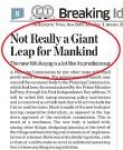No punditry, only platitudes
The leaders on the NITI Aayog were mostly trite in the 'only time will tell' style, plain wrong or lazy rewrites of the press release.
Shocking, says DARIUS NAKHOONWALA.

You don’t say!
Darius Nakhoonwala
Wonders will never cease. There I was, thinking that economists of various hues would hold forth forever on the setting up of the NITI Aayog, the successor body to the Planning Commission.
Instead, all I got was some plaintive bleats from the Opposition, some bureaucratic complaints about resource allocation and some poorly thought-through editorials by leader writers. Poor dears, they didn’t know whether to applaud or boo and ended up carping, some of them with unwarranted verbosity.
The Opposition griping can be ignored because its intentions are never clear. But can we ignore the mighty editorialists? Only at our peril, if only to see how confused these writers are. I was also very surprised that the general papers got it more right than the business ones. They at least didn’t start dispensing advice.
The Business Standard started with a grudging concession. “The new body might, therefore, represent a turn towards genuine and comprehensive policy reform.” Might, it may be noted, not will. Then it restored the balance. “This move is welcome for several reasons.” It proceeded to list them. The first was the mistaken idea that “the government has been woefully short of solid technocratic advice.” I stopped reading there because this is just plain wrong.
The Financial Express patronisingly called it a pragmatic move “at a time when we need to resolve several issues between the Centre and states.” Correct. Well done. Then came the balancer. “Whether NITI Aayog delivers on its other promises remains to be seen.” Well, yes, considering it is less than two weeks since it was set up. Then the writer lapsed into an old lament. “We are creating a new structure which entails a huge cost and we are dismantling an institution with a track-record, even if patchy.” Here, I stopped reading.
Mint wrote an edit of 671 words of which 290 were about the Planning Commission. About the Aayog itself, it had this to say: “The NITI Aayog should not - and cannot - be a resource allocator. It will be better placed to be an adviser. What does that precisely mean?” Pause. Stop.
The Economic Times sounded like the Congress party. “A Planning Commission by any other name will smell pretty much the same... Much is made of the new body promoting cooperative federalism, as opposed to the top down approach of the erstwhile commission. This is much of a muchness.” No evidence cited because, in two weeks, there can be no evidence. Control, alt del.
The Indian Express was far more realistic. “It remains to be seen what the new institution would turn out to be... Whether the NITI Aayog - which is supposed to work as a government strategic think-tank and a national policy advisory body - would be any different is something only its actual functioning will reveal.” That’s it. No need to read further.
The Times of India also got it right. “In this context, NITI Aayog with its emphasis on strategising for all shades of government in India is a good step. Domain expertise and long-term prognosis are now imperative in policymaking. A clear focus, as a think tank, should help transform NITI Aayog into an effective body...Success, however, will depend more on the political executive and the environment they foster. Hopefully, chief ministers will feel encouraged to make the most of the new body.”
The Hindustan Times wrote an uncharacteristically long edit. Most of it was the regurgitation of known facts from the press release. But it did get the key point right. “The new body - National Institution for Transforming India (NITI) - besides serving as the government's go-to policy think-tank, will also have a larger mandate...The NITI Aayog's focus on India's middle class, including the neo-middle class, is also a recognition of the policy-makers' continuing challenge to ensure that this economically vibrant group remains engaged and its potential is fully realised...The new body's role as an enabler for the growth of small businesses is also important.”
The Hindu took the safe way out. It devoted half the space to re-writing the press release. The result was a pedant’s delight. Yawn.
I don’t think the Telegraph bothered to write anything. Maybe that was the best strategy.
Such articles are only possible because of your support. Help the Hoot. The Hoot is an independent initiative of the Media Foundation and requires funds for independent media monitoring. Please support us. Every rupee helps.